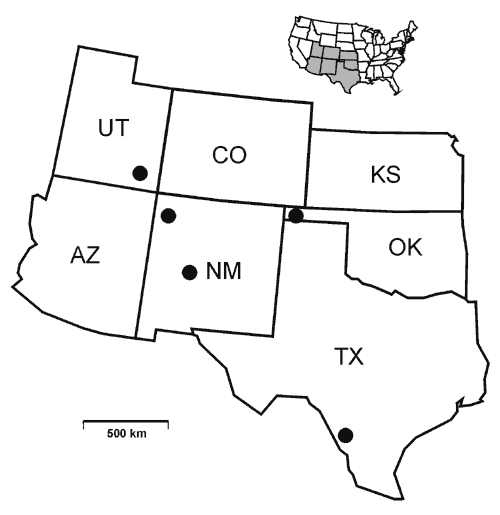Volume 7, Number 3—June 2001
Research
Geographic Distribution and Genetic Diversity of Whitewater Arroyo Virus in the Southwestern United States
Figure 1

Figure 1. . Locations of 14 arenavirus-positive Neotoma rodent collections. San Juan County, southeastern Utah = N. cinerea and N. mexicana (one virus-positive animal each species); Cimarron County, western Oklahoma = N. albigula (2); McKinley County, northwestern New Mexico = N. albigula (2); Socorro County, central New Mexico = N. mexicana (3); Dimmit and La Salle counties (Chaparral Wildlife Management Area), southern Texas = N. micropus (5). The map inset shows the location of study area.
References
- Southern PJ. Arenaviridae: the viruses and their replication. In: Fields BN, Knipe DM, Howley PM, Chanock RM, Melnick JL, Monath TP, et al., editors. Fields virology. 3rd ed. Philadelphia: Lippincott-Raven Publishers; 1996. p. 1505-19.
- Bowen MD, Peters CJ, Nichol ST. The phylogeny of New World (Tacaribe complex) arenaviruses. Virology. 1996;219:285–90. DOIPubMedGoogle Scholar
- Bowen MD, Peters CJ, Nichol ST. Phylogenetic analysis of the Arenaviridae: patterns of virus evolution and evidence for cospeciation between arenaviruses and their rodent hosts. Mol Phylogenet Evol. 1997;8:301–16. DOIPubMedGoogle Scholar
- Weaver SC, Salas RA, de Manzione N, Fulhorst CF, Duno G, Utrera A, Guanarito virus (Arenaviridae) isolates from endemic and outlying localities in Venezuela: sequence comparisons among and within strains isolated from Venezuelan hemorrhagic fever patients and rodents. Virology. 2000;266:189–95. DOIPubMedGoogle Scholar
- Jahrling PB, Peters CJ. Lymphocytic choriomeningitis virus. A neglected pathogen of man [editorial]. Arch Pathol Lab Med. 1992;116:486–8.PubMedGoogle Scholar
- Barton LL, Budd SC, Morfitt WS, Peters CJ, Ksiazek TG, Schindler RF, Congenital lymphocytic choriomeningitis virus infection in twins. Pediatr Infect Dis J. 1993;12:942–6. DOIPubMedGoogle Scholar
- Peters CJ, Buchmeier M, Rollin PE, Ksiazek TG. Arenaviruses. In: Fields BN, Knipe DM, Howley PM, Chanock RM, Melnick JL, Monath TP, et al., editors. Fields virology. 3rd ed. Philadelphia: Lippincott-Raven Publishers; 1996. p. 1521-51.
- Childs JE, Peters CJ. Ecology and epidemiology of arenaviruses and their hosts. In: Salvato MS, editor. The Arenaviridae. New York: Plenum Press; 1993. p. 331-84.
- Berge T, ed. International catalogue of arboviruses and certain other viruses of the world (supplement). Tamiami (TAM), strain W-10777. Am J Trop Med Hyg. 1970;19:1157–8.PubMedGoogle Scholar
- Calisher CH, Tzianabos T, Lord RD, Coleman PH. Tamiami virus, a new member of the Tacaribe group. Am J Trop Med Hyg. 1970;19:520–6.PubMedGoogle Scholar
- Jennings WL, Lewis AL, Sather GE, Pierce LV, Bond JO. Tamiami virus in the Tampa Bay area. Am J Trop Med Hyg. 1970;19:527–36.PubMedGoogle Scholar
- Fulhorst CF, Bowen MD, Ksiazek TG, Rollin PE, Nichol ST, Kosoy MY, Isolation and characterization of Whitewater Arroyo virus, a novel North American arenavirus. Virology. 1996;224:114–20. DOIPubMedGoogle Scholar
- Kosoy MY, Elliot LH, Ksiazek TG, Fulhorst CF, Rollin PE, Childs JE, Prevalence of antibodies to arenaviruses in rodents from the southern and western United States: evidence for an arenavirus associated with the genus Neotoma. Am J Trop Med Hyg. 1996;54:570–5.PubMedGoogle Scholar
- Gonzalez JP, Sanchez A, Ricco-Hesse R. Molecular phylogeny of Guanarito virus, an emerging arenavirus affecting humans. Am J Trop Med Hyg. 1995;53:1–6.PubMedGoogle Scholar
- Thompson JD, Higgins DG, Gibson TJ. CLUSTAL W: improving the sensitivity of progressive multiple sequence alignment through sequence weighting, position-specific gap penalties and weight matrix choices. Nucleic Acids Res. 1994;22:4673–80. DOIPubMedGoogle Scholar
- Weiller GF. TransAlign, version 1.0. Canberra, Australia: Research School of Biological Sciences; 1999.
- Kumar S, Tamura K, Nei M. MEGA: Molecular Evolutionary Genetics Analysis package, version 1.02. University Park (PA): Pennsylvania State University; 1993.
- Felsentein J. Confidence limits on phylogenies: an approach using the bootstrap. Evolution. 1985;39:783–91. DOIGoogle Scholar
- Gonzalez JP, Georges AJ, Kiley MP, Meunier DM, Peters CJ, McCormick JB. Evolutionary biology of a Lassa virus complex. Med Microbiol Immunol (Berl). 1986;175:157–9. DOIPubMedGoogle Scholar
- Johnson KM, Webb PA, Justines G. Biology of Tacaribe-complex viruses. In: Lehman-Grube F, editor. Lymphocytic choriomeningitis virus and other arenaviruses. Berlin: Springer-Verlag; 1973. p. 241-58.
- Musser GG, Carleton MD. Family Muridae. In: Wilson DE, Reeder DM, editors. Mammal species of the world. A taxonomic and geographic reference. Washington: Smithsonian Institution Press; 1993. p. 501-755.
- Centers for Disease Control and Prevention. Fatal illnesses associated with a New World arenavirus-California, 1999-2000. MMWR Morb Mortal Wkly Rep. 2000;49:709–11.PubMedGoogle Scholar
Page created: April 26, 2012
Page updated: April 26, 2012
Page reviewed: April 26, 2012
The conclusions, findings, and opinions expressed by authors contributing to this journal do not necessarily reflect the official position of the U.S. Department of Health and Human Services, the Public Health Service, the Centers for Disease Control and Prevention, or the authors' affiliated institutions. Use of trade names is for identification only and does not imply endorsement by any of the groups named above.